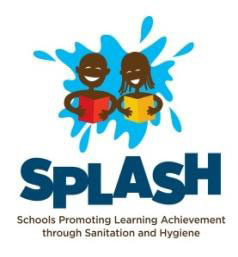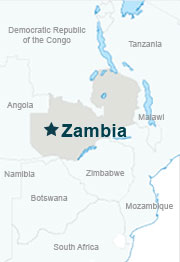Zambia - WASH in Schools
Schools Promoting Learning Achievement through Sanitation and Hygiene SPLASH)
A USAID/Zambia funded WASHplus activity known as SPLASH (Schools Promoting Learning Achievement through Sanitation and Hygiene) supported the Ministry of Education to bring clean drinking water, sanitation and hygiene education to primary schools in Eastern Province.
The goal of SPLASH was to improve health, learning and performance of primary school pupils and teachers by providing a cleaner and safer learning environment. Project activities focused on provision of safe water and adequate sanitation and the adoption of better hygiene practices. SPLASH was part of the USAID/Zambia Education Team’s portfolio that included other projects designed to strengthen the MOE institutional, teacher and pupil performances, especially in reading achievement. SPLASH contributed by tackling student attendance and dropout rates, teacher attrition, and overall health and well-being. SPLASH aimed to strengthen local operations and maintenance and management capacity by offering innovative solutions to commonly encountered technical and organizational problems, and linking school efforts to community development and ownership. (More about SPLASH)
Girls and female teachers are disproportionately affected by poor access to sanitation. SPLASH’s comprehensive school-based menstrual hygiene management program trains teachers and provided them with materials for counseling and supporting girls and involving their families. Schools are encouraged to stock sanitary pads along with other hygiene consumables, and girls’ latrines are equipped with washrooms.
SPLASH embeds WASH in the MOE system. The official School Monitoring Instrument now has an extensive WASH section that includes MHM and O&M, and WASH is part of the new curriculum. SPLASH supported the integration through teacher in-service training and provision of materials.
Celebrating Menstrual Hygiene Day
SPLASH Events on Menstrual Hygiene Day 2015
A Poem on Menstrual Hygiene by Students of the Magwero School for the Blind
Stories
 |
SPLASH Spillover: Unexpected construction results from SPLASH project interventions. School WASH can be a powerful springboard for household level WASH and community development. Read more. |
 |
Trained artisans are a key recipe for sustainability in Zambia’s Eastern Province. Through training and mentoring, the project created a cadre of professionals ready to repair SPLASH-installed infrastructure as the need arises. Read more. |
 |
Integrating WASH/MHM into Existing Government Systems.. SPLASH in Zambia’s Eastern Province has served as a model for the Ministry of Education, Science, Vocational Training and Early Education to demonstrate: integration of water, sanitation, and hygiene (WASH) and menstrual hygiene management (MHM) into schools and the curriculum. Read more. |
 |
School Leaders Witness Increased Attendance and Enrollment at Schools with Improved Sanitation Infrastructure. Throughout the SPLASH districts, head teachers repeat the observation that attendance improves and enrollment increases when SPLASH installs new water points, toilets, and washrooms. The SPLASH School Outcome Study will soon quantify these jumps. Read more. |
 |
Sustainable Approaches: Strategies for Operations and Maintenance.. Building new sanitation facilities and providing functioning water points to schools is just the first step in the USAID–funded SPLASH project’s goal of creating healthy school environments that encourage learning and achievement. Read more. |
 |
Improvements in Water Access and Quality Extend beyond the Schoolyard.SPLASH accompanies the installation of water points at school with outreach to the community to ensure all beneficiaries contribute to maintenance and upkeep and that behaviors taught at school will be carried over at home. Read more. |
 |
Shifting Social Norms Pave the Way for Sustainability. What a village headman and a school teacher learn about sanitation and menstrual hygiene, respectively, during SPLASH education sessions calls into question old beliefs and has a lasting and profound impact on the individuals and their communities. Read more. |
 |
SPLASH Encourages a Community Approach to Menstrual Hygiene Management. SPLASH’s comprehensive WASH in Schools program includes a strong menstrual hygiene management (MHM) component. Having the confidence to attend school at all times can make the difference between succeeding and dropping out for many adolescent girls. Read more. |
 |
Success Story: Falling in Love All Over Again. “Life in rural Zambia is unbearable.” This is the story that is always heard among newly trained teachers who are posted in rural areas. This reaction is due to the perception that rural schools have poor or inadequate water and sanitation facilities. Read more. |
 |
Let Kids Learn: Boosting Opportunity for Girls and Boys through WASH in Schools. Clean water, adequate sanitation and proper hygiene require appropriate facilities and an awareness of good practices. Through the SPLASH partnership, CARE International supports the construction of boreholes and sanitation facilities, while FHI 360 supports teacher training and curriculum development. Local ministries, nongovernmental organizations and communities take it from there. Read |
Publications
- A Teacher’s Guide to Integrating WASH in School, 2015.This guide supports the teaching and learning about water, sanitation, and hygiene (WASH) in Zambian primary schools and provides technical content for the teacher to familiarize himself/herself with the subject of WASH, including suggestions on how WASH content can be integrated into the classroom.
-
School WASH Facilities: Operations and Maintenance Guidelines, 2015. This manual addresses the key O&M tasks necessary to ensure the smooth functioning of school WASHE services and the longevity of related hardware. It covers these key aspects of O&M and includes related tools.
-
WASH in Zambian Primary Schools: Essential Elements for Quality Education. Dr. Justin Lupele and Sarah Fry, SPLASH and WASHplus, FHI 360. A Presentation at the Comparative and International Education Society Conference 2015.
-
WASH-Friendly Schools: A Training Resource for SPLASH Use, 2014. The Training Guide for WASH-Friendly Schools and the companion Basic Guide is now a tested package that SPLASH has adapted and refined from country-specific models for use in schools, communities, governments, and organizations anywhere. The complementary guide is intended to be useful to those working for the benefit of children in resource-poor environments who, like children everywhere, have the right to a safe, clean, and welcoming school environment. It is envisioned that this guide will support the creation of an enabling environment to establish WASH-Friendly Schools.
-
Exploring the Potential of Schoolchildren as Change Agents in the Context of School WASH in Rural Zambia: Final Report, 2014. In this study, researchers explored the potential for children to be change agents for behavior change and technology adoption in their households. The work was conducted in the context of a school-based WASH program, SPLASH, funded by USAID| Zambia and managed by the USAID WASHplus project. Based on the results there are four major areas that SPLASH can target to encourage children to become change agents.
-
Zambia Eastern Province WASH in Schools INDABA Whole System in the Room-Strategic Planning Workshop Report, 2012. (pdf, 916KB)
- Menstrual Hygiene Management Mini-Toolbox for Teachers and Schools in Zambia, 2015. SPLASH (Schools Promoting Learning Achievement through Sanitation and Hygiene) Project. Menstrual Hygiene Management or MHM is an important component of a “WASH Friendly School”. As it is a new concept in schools, SPLASH is offering various kinds of support to teachers to help set up MHM programs and facilities to help keep girls and female teachers in school. This toolkit was designed to help classroom and guidance teachers, SHN coordinators, and other school personnel in Zambian primary schools who are carrying out menstrual hygiene management (MHM) programs or activities in their school. As MHM gets more established in schools, more and better tools will be developed and added to the toolkit.
Videos
SPLASH and the Indaba
SPLASH in the News
- Zambia's Eastern Province Schools Help Girls Stay in School Through WASH. An article by Sergio Ramírez-Mena/Chemonics International in the Huffington Post, April 6, 2015.


 Zambia Quick Facts
Zambia Quick Facts